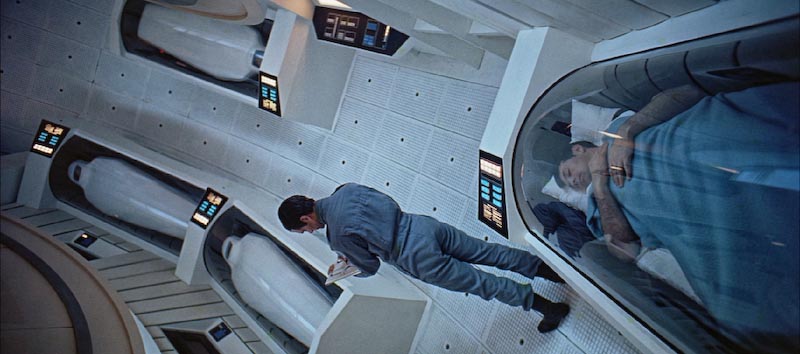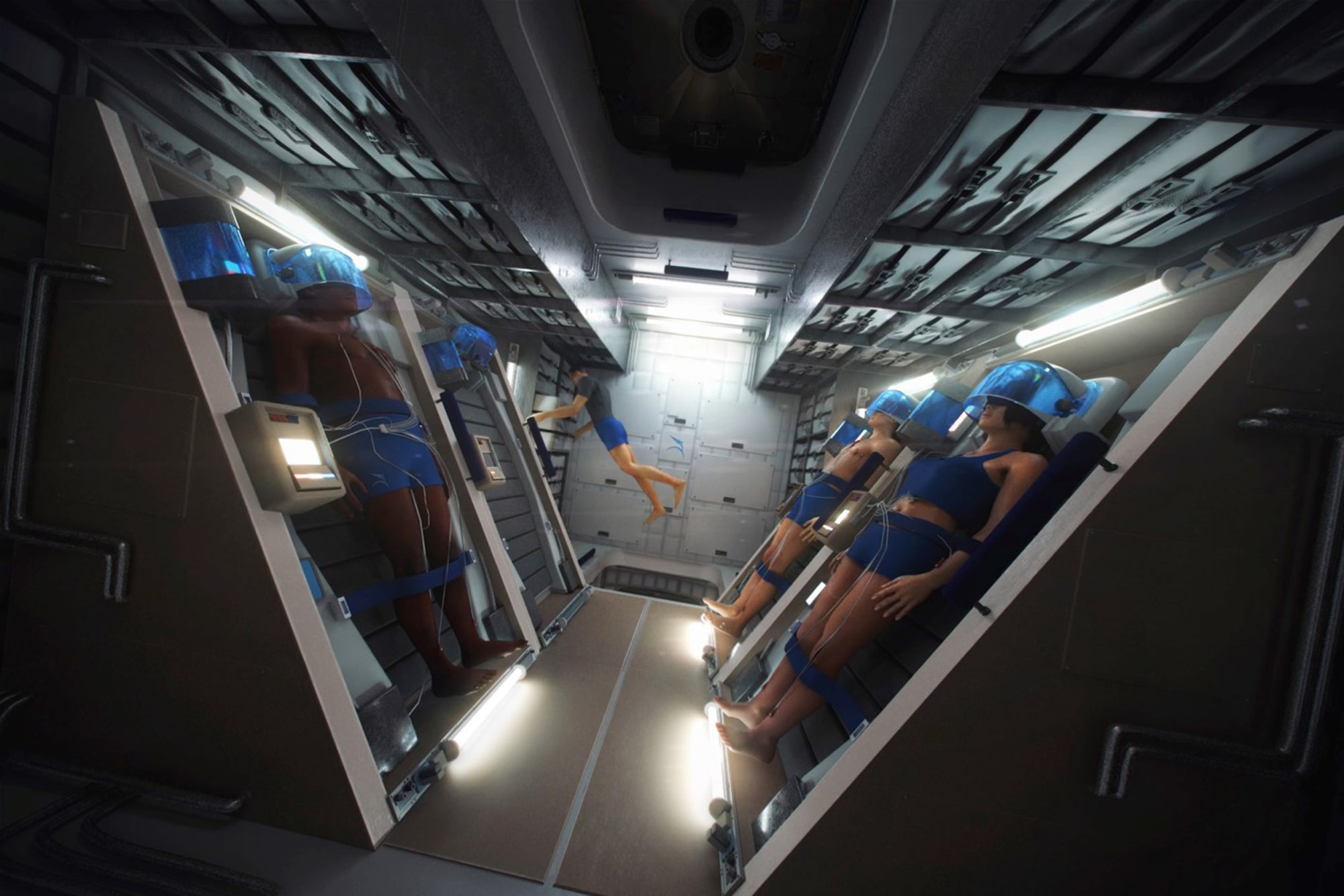New Mars Forums
You are not logged in.
- Topics: Active | Unanswered
Announcement
Pages: 1
#1 2017-09-07 08:59:49
- RobertDyck
- Moderator
- From: Winnipeg, Canada
- Registered: 2002-08-20
- Posts: 8,353
- Website
Suspended animation to Mars
Popular Science article that someone posted to Facebook today, in the Mars Society group: How we'll nap our way to Mars
This is what real suspended animation will look like.
Imagine a road trip that lasts six months—no pit stops, black night the whole way. That’s how long it would take you, and how monotonous it would be, to fly to Mars. To avoid the boredom (and its cousins depression and anxiety), you could spend part of your trip in artificial hibernation, or torpor, as it’s medically known. NASA is funding research into this method for future planet hoppers, and not just to reduce the games of I Spy. Because metabolism slows during slumber, you would require less food and water, reducing a mission’s cargo weight, fuel needs, and price tag. Also, you wouldn’t want to kill your crew mates. Here’s how you might go nighty-night and save your sanity on your 34-million-mile flight.Step 1: Pod People
You enter the torpor pod. Using an IV placed in a central vein in your chest, a crew mate injects a sedative similar to propofol to prevent shivering, then tapes sensors to your skin. These will monitor heart rhythm, blood pressure, oxygen levels, and other stats.Step 2: Straight Chillin’
Once the sedative knocks you out, the pod begins cooling the air around your body. This lowers your core temperature a few degrees per hour, from a healthy 98.6°F to below the point of hypothermia. Crew members may also cool you with gel pads or icy nasal spray.Step 3: Low Maintenance
The crew pushes anticoagulants through the central line to prevent blood clots from forming—if they break free, they can block blood vessels. IV antibiotics help stave off infection. And robotic systems periodically stimulate your muscles to prevent atrophy.
First, why are they standing? Science fiction shows in the 1960s depicted those asleep as lying down. But for some reason, shows in the 1980s and later show them standing. Why?
Star Trek, the original series. Episode: "Space Seed".
movie "2001: A Space Odyssey", inside the ship called "Discovery".
Lost in Space, 1998 movie
Stargate SG1, episode "Lifeboat".
At least the "Alien" series of movies, and the new movie "Passengers" shows people lying down.
But more importantly, why would we do this? Transporting humans unconscious, with their blood circulated through some device, unattended? That's just asking for blood clots or other problems. Instead of trying to avoid zero-G problems with suspended animation, why not just use artificial gravity?
Offline
Like button can go here
#2 2017-09-07 10:30:27
- Oldfart1939
- Member
- Registered: 2016-11-26
- Posts: 2,489
Re: Suspended animation to Mars
Just another stupid is as stupid does concept from NASA? The key to making a deep space journey w/o going bonkers is basic: crew selection process. Just give me enough books to read and stuff to stimulate my mind--I'd be fine.
Offline
Like button can go here
#3 2017-09-07 15:51:01
- SpaceNut
- Administrator
- From: New Hampshire
- Registered: 2004-07-22
- Posts: 30,201
Re: Suspended animation to Mars
Some would be happy playing tennis or handball or other physically exertive activity including a good run or jog...
Yes there has been lots of research and it will take lots more to make it successful but I think it will be more likely that it would be used to get from one star to the next.....
Offline
Like button can go here
#4 2017-09-08 05:07:18
- louis
- Member
- From: UK
- Registered: 2008-03-24
- Posts: 7,208
Re: Suspended animation to Mars
Couldn't agree more. This really is a waste of time and money. Perhaps in 50 years or so it will have some relevance but for the time being it is a complete distraction. The premise that the crew will be subject to boredom, depression and anxiety is not supported by the ISS experience...and personally I couldn't think of anything much more exciting than heading for Mars, knowing you're getting 0.5% closer every day...for me that would be like anticipating Christmas as a child. Also you would get a chance to catch up on things you have always meant to read, listen to, or watch on your laptop. You could study a whole new subject area as you travel. Sounds great to me.
Just another stupid is as stupid does concept from NASA? The key to making a deep space journey w/o going bonkers is basic: crew selection process. Just give me enough books to read and stuff to stimulate my mind--I'd be fine.
Let's Go to Mars...Google on: Fast Track to Mars blogspot.com
Offline
Like button can go here
#5 2017-09-08 07:07:58
- Oldfart1939
- Member
- Registered: 2016-11-26
- Posts: 2,489
Re: Suspended animation to Mars
This is just another workfare scheme, designed to keep some behavioral scientists employed on the Government teat. Just review the crews on nuclear submarines, and the base at Antarctica for some comparisons. Done deal.
Offline
Like button can go here
#6 2017-09-13 13:23:39
- elderflower
- Member
- Registered: 2016-06-19
- Posts: 1,262
Re: Suspended animation to Mars
We are only going to Mars, not Proxima Centauri (not for a while yet). We don't need suspended animation. Even today yachtsmen take months going around the world.
Boredom can be relieved by exercise, work, study and games. Humour also helps. It only takes three to put on a performance of Waiting for Godot, four to play a round of bridge. I'm sure an inventive group can come up with something.
Offline
Like button can go here
#7 2017-09-13 15:26:45
- IanM
- Member
- From: Chicago
- Registered: 2015-12-14
- Posts: 276
Re: Suspended animation to Mars
RobertDyck, didn't you post something similar in the livestock threads about using suspended animation for animals by using a saline solution in their blood, which gave the animals some brain damage? I'd much prefer at worst a couple months of boredom than a lifetime of that.
The Earth is the cradle of the mind, but one cannot live in a cradle forever. -Paraphrased from Tsiolkovsky
Offline
Like button can go here
#8 2017-09-13 16:30:39
- SpaceNut
- Administrator
- From: New Hampshire
- Registered: 2004-07-22
- Posts: 30,201
Re: Suspended animation to Mars
Frozen bodies do get ice crystal damage but hibernation does not freeze thou the process of aging still moves forward but at a slowed rate.
A person put into a drug introduced coma is as close as we can get to hibernation for humans most likely.
Offline
Like button can go here
#9 2018-10-21 16:15:06
- SpaceNut
- Administrator
- From: New Hampshire
- Registered: 2004-07-22
- Posts: 30,201
Re: Suspended animation to Mars
The journey to mars would be less of a consuming load but what would the out come be....
Human powers of hibernation may be dormant in genetic code; "It sounds like science fiction, but there is absolute biological truth to this."

Bears do it. So do groundhogs, squirrels, turtles and many other animals. Some warm-blooded animals spend weeks during which their body temperature falls from around 37 degrees Celsius to as low as 3 degrees Celsius, their hearts beat just a few times a minute and the body’s energy consumption plummets.
Offline
Like button can go here
#10 2018-10-21 19:22:52
- Belter
- Member
- Registered: 2018-09-13
- Posts: 184
Re: Suspended animation to Mars
I'd rather be conscious, thanks. If you have a problem, you want all hands on deck immediately, not in a few hours.
Offline
Like button can go here
#11 2018-10-21 19:24:27
- Belter
- Member
- Registered: 2018-09-13
- Posts: 184
Re: Suspended animation to Mars
And I definitely wouldn't want to wake up dead, like Pelham.
Offline
Like button can go here
#12 2022-05-11 17:21:41
- Mars_B4_Moon
- Member
- Registered: 2006-03-23
- Posts: 9,776
Re: Suspended animation to Mars
Rat testicle cells make sperm after being frozen for 23 years
Offline
Like button can go here
#13 2022-05-23 05:57:26
- Mars_B4_Moon
- Member
- Registered: 2006-03-23
- Posts: 9,776
Re: Suspended animation to Mars
Here's Why Hibernation in Space May Not Be Possible For Future Space Travelers
Offline
Like button can go here
Pages: 1



